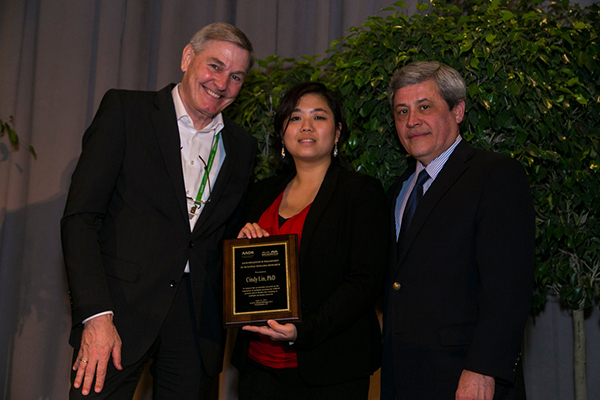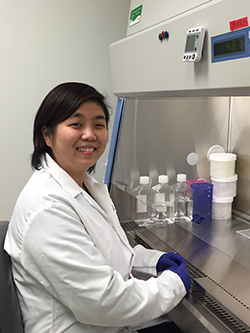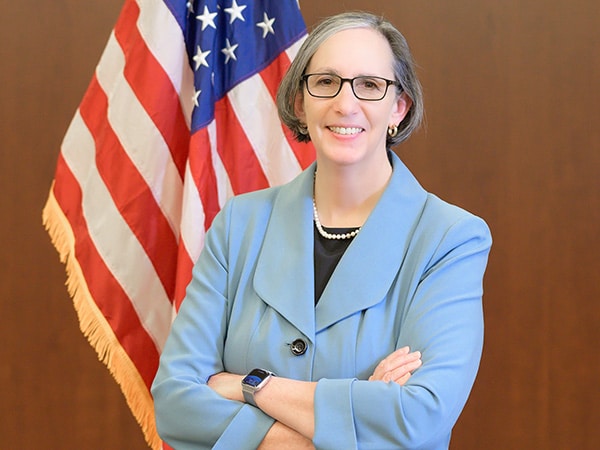Multiple Myeloma Researcher Forges a Career Path in Immuno-oncology
Myeloma is the third most common blood cancer in the United States, arising in the plasma cells of the immune system responsible for making antibodies that assist the body in warding off infection and illness. Under normal conditions, plasma cells play an integral role in the immune response; however, these cells can acquire mutations that cause them to multiply uncontrollably, resulting in the development of a tumor. When the cancerous plasma cells accumulate to form tumors within several areas of the bone or soft tissue throughout the body, it is characterized as “multiple myeloma.” Despite the advancements made in treatment of multiple myeloma, it remains an incurable cancer with a five-year survival rate of 45 percent.
Cindy Lin, PhD, a postdoctoral scientist at The Wistar Institute, wants to improve these statistics. In 2015, she received the AACR-Millennium Fellowship in Multiple Myeloma Research* to investigate the role of a calcium-binding protein, termed S100A9, in regulating the development and progression of this disease.
“Multiple myeloma is a complex and heterogeneous disease, and the tumor microenvironment plays a critical role in influencing tumor behavior,” says Lin. “My work examines the role of both cellular and non-cellular components in the tumor microenvironment, and the mechanisms by which these components influence myeloma progression and survival.” She hopes that, by inhibiting the S100A9 protein, she will be able to reduce the growth of blood vessels (angiogenesis) within multiple myeloma tumors, thereby improving treatment responses and patient outcomes.
Lin’s interest in pursuing a career in myeloma research stemmed from an earlier interest in immunology, as an undergraduate at Monash University in Australia.
“Immunology appealed to me from the beginning,” says Lin. “I was fascinated by how exquisitely complex our immune system is, and how everything works in concert to protect us from harmful pathogens, as well as our own cells that, when mutated, can cause diseases like cancer.”
When she began her doctoral studies, also at Monash, she searched for a laboratory that could blend her interests in immunology and cancer, but that also took a translational approach to research.
“For my graduate studies, I wanted to work on a project that had more relatable outcomes for patients,” Lin recalls. “The concept of making research clinically relevant is one that was, and is still, very important to me.” In searching for a lab that could satisfy her interests, Lin found the Myeloma Research Group at the Australian Centre for Blood Diseases, which was conducting a unique mix of basic and translational research. “Joining this team,” Lin says, “allowed me to gain valuable experience in conducting clinically-relevant research.”
For her postdoctoral position, Lin wanted to expand her experiences beyond what she obtained in Australia. So when the opportunity arose for her to travel to the United States to join the lab of Yulia Nefedova, MD, PhD, assistant professor at Wistar, she says she jumped at the chance.
“The U.S. holds so many opportunities for researchers, not only in their work, but also to learn and collaborate,” says Lin. “My interests were still centered on clinically relevant research, but I also wanted to learn something new, which is why I chose to focus on immuno-oncology, which is now such an exciting, and rapidly growing, field.”

Cindy Lin, PhD, (center) received the AACR-Millennium Fellowship in Multiple Myeloma Research. Presenting Lin with the fellowship at the 2015 AACR Annual Meeting is Manfred Lehnert, MD, (left) vice president and head of Innovation at Takeda Pharmaceuticals and Carlos L. Arteaga, MD, (right) past president of the AACR. Photo by © AACR/Todd Buchanan 2015.
Lin is now six months into the one-year term of her AACR-Millennium Fellowship, and is making progress toward her research aims. She is also appreciative of being considered for this funding as an international postdoctoral fellow.
“This fellowship has greatly assisted my research by providing me with critical financial support,” Lin says. “Being an international postdoc, I am eligible for fewer funding opportunities here than many of my American colleagues, so the award has alleviated some of the pressure to acquire grant funding, and has really given me the freedom to dive in and focus on my work.”
*Note: Millennium is now Takeda Oncology.




